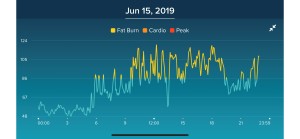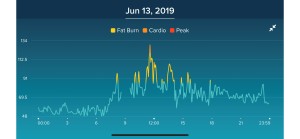I started wearing a Fitbit® last year. I thought the heart rate, sleep and other data could be interesting to have; plus, it could help me hold myself accountable for my fitness and sleep goals. It wasn’t quite clear how I would use the data, but I decided to commit to collecting it, which would mean wearing the watch every day.
I now have enough data to set a baseline. I know my resting heart rate, my active heart rate, how much I’m sleeping on average, etc. Nice information to have, albeit not the most interesting subject for a blog post. I started to then think about how I could use this data to analyze my response to different activities. I decided to compare my physiological response between two very different situations.
I’m an avid hiker. My leisure time is often spent “suffering” on a trail somewhere. I really do enjoy steep ascent and never-ending views. There is something about the exhaustion and endurance needed on a mountain ascent that makes the views that much more enjoyable. Over the summer, a friend and I decided to do one of our favorite hikes in the White Mountains. The hike was a 16-mile traverse with 3000 feet of steep elevation gain and a long descent. We finished the hike in 10 hours. It was a very challenging and rewarding day.

This is a typical heart rate chart for me when I’m doing an extended activity. I tend to level off and stay in a reasonable cardio zone. My recovery is quick during these periods, meaning I can take a quick break and regain the stamina to keep going. You can even see where we stopped to eat lunch and nap on the ridgeline around 14:00 (2pm), not far from where this photo was taken.

I decided to compare this data to a relatively impactful situation within a recent project. As a part of some scheduled conflict resolution, all parties involved decided to have a conversation to discuss the conflict and problem solve together to move forward. These types of conversations/interactions can be a source of anxiety and discomfort, but like the mountain ascent, can be rewarding if the conflict is overcome and a resolution is found. The hour long meeting was also very challenging, but in a very different, obvious way.

What is most interesting about this data is the peak heart rate (133bpm) on 6/13 was achieved in a chair. No cardio, no movement. Instead, it was solely the emotional response to the situation that sent my heart rate higher than the mountain did that weekend (max was 123bpm). Physiologically speaking, the stress that is generated within each of us, is specific to us. We are both the producer and experiencer of stress. Our thoughts can produce a physiological reaction and that reaction manifests as stress in the body. Does this mean I should add more stressful situations to my cardio workout routine? 😊
I read a lot books, blogs and content about managing stress, mindfulness and meditation. I am a casual meditator. I try to get my 15-30-minute meditation session in daily. For me it makes a difference in my ability to manage the day. I tend to notice the difference when I haven’t meditated for a period of time, especially if things are stressful, like they were last June.
Why didn’t I use any of these techniques the day of this stressful meeting? Instead, I just went about my day without any preparation for the stress and discomfort that would occur during that meeting. Would my stress level and heart rate be any different had I stood in a power pose or meditated for a few minutes beforehand? The answer is probably yes. The truth is, I would never go into a hike cold, the way I went into that meeting. I would have prepared for the hike by hydrating and stretching to ensure my body was prepared for the task at hand. Last summer was a reminder that my self-care routines are a daily practice and I need to make sure I make the time for these routines. I need to care for my mind in a similar manner that I do for my body.
What self-care practices do you use to manage stress?

Such a great use of analytics! And a great reminder about physical vs mental stress. Perhaps we pay more attention to the former because we grew up in a fitness aware generation, whereas mindfulness seems to just be hitting its stride now…
Love this data, Meagan! Great write up.
One of my favorite posts ever in this series. Not only because I also love hiking (a 16-mile day hike is getting-it-done, by the way!) but because I wouldn’t believe this if I weren’t seeing the recorded data. A great insight into the difference between what we may think stresses our body and what actually stresses our body.